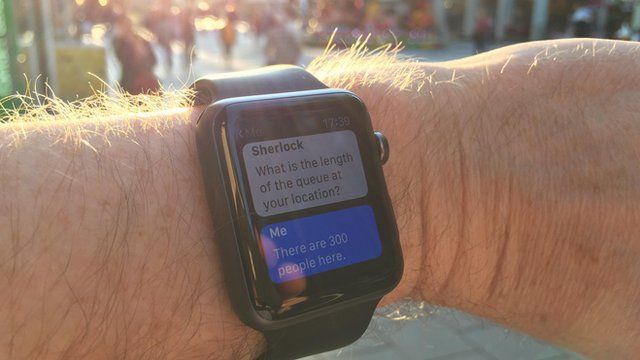Cardiff University develops virtual assistant dubbed Sherlock
- Published

A virtual assistant that can communicate in a human-like way has been developed at Cardiff University.
Sherlock (Simple Human Experiment Regarding Locally Observed Collective Knowledge) is similar to smartphone assistants such as Apple's Siri or Microsoft's Cortana.
It uses controlled natural language technology developed by IBM.
As well as answering questions, it also asks them in an effort to build up its knowledge base.
Such a system ensures that the software and the user "understand each other", project leader Prof Alun Preece told the BBC.
"You can ask Sherlock what it knows and it will tell you in natural language," he added.
Smartphone assistants have become better at interacting with people but many still find them frustrating.
Prof Preece understands that frustration.
"With Siri I take it out to ask for directions and it gives me driving instructions even though I always take the train."
By contrast, he said: "I would tell Sherlock that I take the train and so it would know that I always take the train and would give me that information."
So far the system, which is a currently just a research project, has been tested in a range of scenarios, including helping the emergency services and as an information app at a festival.
In the second case, it would crowdsource information from many users - such as asking a user queuing for food how long the queues were - to build up a knowledge base.
Other applications include being used as a smart home assistant.
"In a home that has a smart thermostat and devices that can detect if a window is open, a user might say to Sherlock 'I'm cold' and it would offer alternatives such as 'I can close the window or turn the heating up'", explained Prof Preece.
Recently the system had its first public trial at a BBC Make it Digital event in Cardiff. It was made available for download via a web browser.
During the event, it acted as a quizmaster, answering questions about BBC shows such as Doctor Who and its namesake Sherlock.
Participants could ask Sherlock questions and it would draw on previous answers given to it by other members of the public.
The next project will involve around 100 students at the university using Sherlock to help find objects that are hidden around the campus.
"It is not a product at the moment so we don't yet have a particular use or niche for Sherlock," said Prof Preece.
And even when it does have a use, Sherlock, like existing smartphone assistants, will only be able to respond to specific tasks.
Prof Preece acknowledges that, in future, people will want a more general software assistant that can help in all aspects of their lives.
"What things like Siri and Google Now have done is opened the door for technology that has been bubbling away for many years. That technology promises to speed up the process of making software more capable and I think we will make huge jumps in the next five years," he said.
- Published21 September 2015
- Published13 February 2014